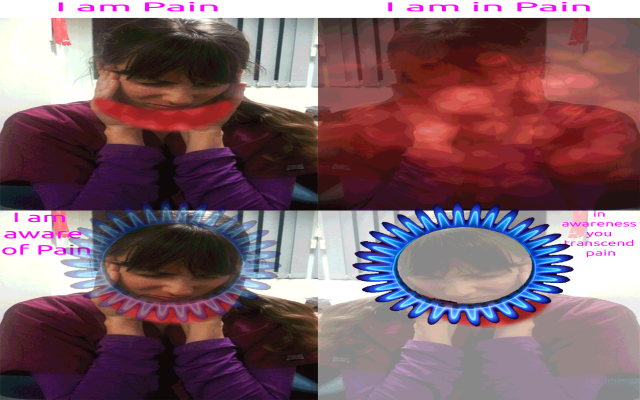Aware of Pain
Suicide
April 28, 2016Paralysis
April 28, 2016You are in pain — what is really happening inside? Analyze the whole phenomenon: the pain is there, and there is this consciousness that pain is there. These are the two points: the pain is there, and there is this consciousness that the pain is there. But there is no gap, and somehow, “I am in pain” — this feeling happens — “I am in pain.” And not only this — sooner or later, “I am the pain” begins, happens, starts to be the feeling.
The witnessing self is never felt. We always feel some identity; we always feel some identification. And the witnessing consciousness is the reality. So why does this happen? And how does this happen?
“I am pain; I am in pain; I am aware of the pain” — these are three different, very different states. The rishi says, “I am aware of the pain.” This much can be allowed, because then you transcend pain. The awareness transcends — you are different from the pain, and there is a deep separation. Really, there has never been any relation; the relation begins to appear only because of the nearness, because of the intimate nearness of your consciousness and all that happens around.

Consciousness is so near when you are in pain — it is just there by the side, very near. It has to be; otherwise, the pain cannot be cured. It has to be just near to feel it, to know it, to be aware about it. But because of this nearness, you become identified, and one. This is a safety measure again; this is a security measure, a natural security. When there is pain you must be near; when there is pain your consciousness must go in a rush towards the pain — to feel it, to do something about it.
You are on the street and suddenly you feel a snake there — then your whole consciousness just becomes a jump. No moment can be lost, not even in thinking what to do. There is no gap between being aware and the action. You must be very near; only then this can happen. When your body is suffering pain, disease, illness, you must be near; otherwise, life cannot survive. If you are far off and the pain is not felt, then you will die. The pain must be felt immediately — there should be no gap. The message must be received immediately, and your consciousness must go to the spot to do something. That’s why nearness is a necessity. But because of this necessity, the other phenomenon happens: so near, you become one; so near, you begin to feel, “This is me — this pain, this pleasure.” Because of nearness there is identification: you become anger, you become love, you become pain, you become happiness.
There are two ways to disassociate yourself from these false identities. You are not what you have been thinking, feeling, imagining, projecting; what you are is simply the fact of being aware. Whatsoever happens, you remain just the awareness. You are awareness — that identity cannot be broken, that identity cannot be negated. All else can be negated and thrown; awareness remains the ultimate substratum, the ultimate base. You cannot deny it, you cannot negate it, you cannot disassociate yourself from it. So this is the process: That which cannot be thrown, that which cannot be made separate from you, is you; that which can be separated, you are not. The pain is there; a moment later it may not be there — but you will be. Happiness has come, and it will go; it has been, and it will not be — but you will be. The body is young, then the body becomes old. All else comes and goes — guests come and go — but the host remains the same. So the Zen mystics say: Do not be lost in the crowd of the guests. Remember your host-ness. That host-ness is awareness. That host-ness is the witnessing consciousness. What is the basic element that remains always the same in you? Only be that, and disidentify yourself from all that comes and goes. But we become identified with the guest. Really the host is so occupied with the guest, he forgets.
Mulla Nasruddin has given a party for some friends and some strangers. The party is very boring, and half the night is just lost and it goes on. So one stranger, not knowing that Mulla is the host, says to him, “I have never seen such a party, such nonsense. It seems never-ending, and I am so bored that I would like to leave.”
Mulla says, “You have said what I was going to say to you. I myself have never seen such a boring and nonsense party before, but I was not so courageous as you are. I was also thinking to leave it and just run away.” So they both run.
Then, in the street Mulla remembers and says, “Something has gone wrong, because now I remember: I am the host! So please excuse me, I have to go back.”
This is happening to us all. The host is lost, the host is forgotten every moment. The host is your witnessing self. Pain comes and pleasure follows; there is happiness, and there is misery. And each moment, whatsoever comes you are identified with it, you become the guest. Remember the host. When the guest is there, remember the host. And there are so many types of guests: pleasurable, painful; guests you would like, guests you would not like to be your guests; guests you would like to live with, guests you would like to avoid — but all guests. Remember the host. Constantly remember the host. Be centred in the host. Remain in your host-ness; then there is a separation. Then there is a gap, an interval — the bridge is broken. The moment this bridge is broken, the phenomenon of renunciation happens. Then you are in it, and not of it. Then you are there in the guest, and still a host. You need not escape from the guest — there is no need .
Growth is painful because you have been avoiding a thousand and one pains in your life. By avoiding you cannot destroy them — they go on accumulating. You go on swallowing your pains; they remain in your system. That’s why growth is painful — when you start growing, when you decide to grow, you have to face all the pains that you have repressed. You cannot just bypass them.
Pain and pleasure are intrinsic parts of life. People are so much afraid of pain that they repress pain, they avoid any situation that brings pain, they go on dodging pain. And finally they stumble upon the fact that if you really want to avoid pain you will have to avoid pleasure. That’s why monks avoid pleasure — they are afraid of pleasure. In fact they are simply avoiding all possibilities of pain. They know that if you avoid pleasure then naturally great pain is not possible; it comes only as a shadow of pleasure. Then you walk on the plain ground — you never move on the peaks and you never fall into the valleys. But then you are living dead, then you are not alive.
Life exists between this polarity. This tension between pain and pleasure makes you capable of creating great music; music exists only in this tension. Destroy the polarity and you will be dull, you will be stale, you will be dusty — you won’t have any meaning and you will never know what splendor is. You will have missed life.
The man who wants to know life and live life has to accept and embrace death. They come together, they are two aspects of a single phenomenon. That’s why growth is painful. You have to go into all those pains that you have been avoiding. It hurts. You have to go through all those wounds that somehow you have managed not to look at. But the deeper you go into pain, the deeper is your capacity to go into pleasure. If you can go into pain to the uttermost limit, you will be able to touch heaven.
To be free of pain the pain has to be accepted, inevitably and naturally. Pain is pain — a simple painful fact — but suffering is only and always the refusal of pain, the claim that life should not be painful. It is the rejection of a fact, the denial of life and of the nature of things. Death is the mind and mind’s dying. Where there is no fear of death, who is there to die?
Pain is simply pain; there is no suffering in it. Suffering comes from your desire that the pain should not be there, that there is something wrong in pain. Watch, witness, and you will be surprised. You have a headache: the pain is there but suffering is not there. Suffering is a secondary phenomenon, pain is primary. The headache is there, the pain is there; it is simply a fact. There is no judgment about it. You don’t call it good or bad, you don’t give it any value; it is just a fact. The rose is a fact, so is the thorn. The day is a fact, so is the night. The head is a fact, so is the headache. You simply take note of it.
Buddha taught his disciples that when you have a headache simply say twice “Headache, headache.” Take note. But don’t evaluate, don’t say “Why? Why has this headache happened to me? It should not happen to me.” The moment you say, “It should not,” you bring suffering in. Now suffering is created by you, not by the headache. Suffering is your antagonistic interpretation, suffering is your denial of the fact. And the moment you say, “It should not be,” you have started avoiding it, you have started turning yourself away from it. You would like to be occupied in something so that you can forget it. You turn the radio or the television or the mobile on or you go to the club or you start reading or you go and start working in the garden — you divert yourself, you distract yourself. Now that pain has not been witnessed; you have simply distracted yourself. That pain will be absorbed by the system.
Let this key be very deeply understood. If you can witness your headache without taking any antagonistic attitude, without avoiding it, without escaping from it; if you can just be there, meditatively there — “Headache, headache” — if you can just simply see it, the headache will go in its time. 1 am not saying that it will go miraculously, that just by your seeing it will go. It will go in its time. But it will not be absorbed by your system, it will not poison your system. It will be there, you will take note of it, and it will be gone. It will be released.
When you witness a certain thing in yourself it cannot enter into your system. It always enters when you avoid it, when you escape from it. When you become absent then it enters into your system. Only when you are absent can pain become part of your being — if you are present your very presence prevents it from becoming part of your being. And if you can go on seeing your pains you will not be accumulating them. You have not been taught the right clue, so you go on avoiding. Then you accumulate so much pain, you are afraid to face it, you are afraid to accept it. Growth becomes painful — it is because of wrong conditioning. Otherwise growth is not painful, growth is utterly pleasant.
When the tree grows and becomes bigger do you think there is pain? There is no pain. Even when a child is born, if the mother accepts it there will be no pain. But the mother rejects it; the mother is afraid. She becomes tense, she tries to hold the child inside — which is not possible. The child is ready to go out into the world, the child is ready to leave the mother. He is ripe, the womb cannot contain him anymore. if the womb contains him anymore the mother will die and the child will die. But the mother is afraid. She has heard that it is very painful to give birth to a child — birth pangs, birth pain. She is afraid, and out of fear she becomes tense and closed.
Remember, only one thing is going to help you: awareness — nothing else. Growth will remain painful if you don’t accept life in all its ups and downs. The summer has to be accepted and the winter too. This is what I call meditation. Meditation is when you are emptied of all that is old and told and done to death. Then you see. Or rather, then there is seeing: the birth of the new.



